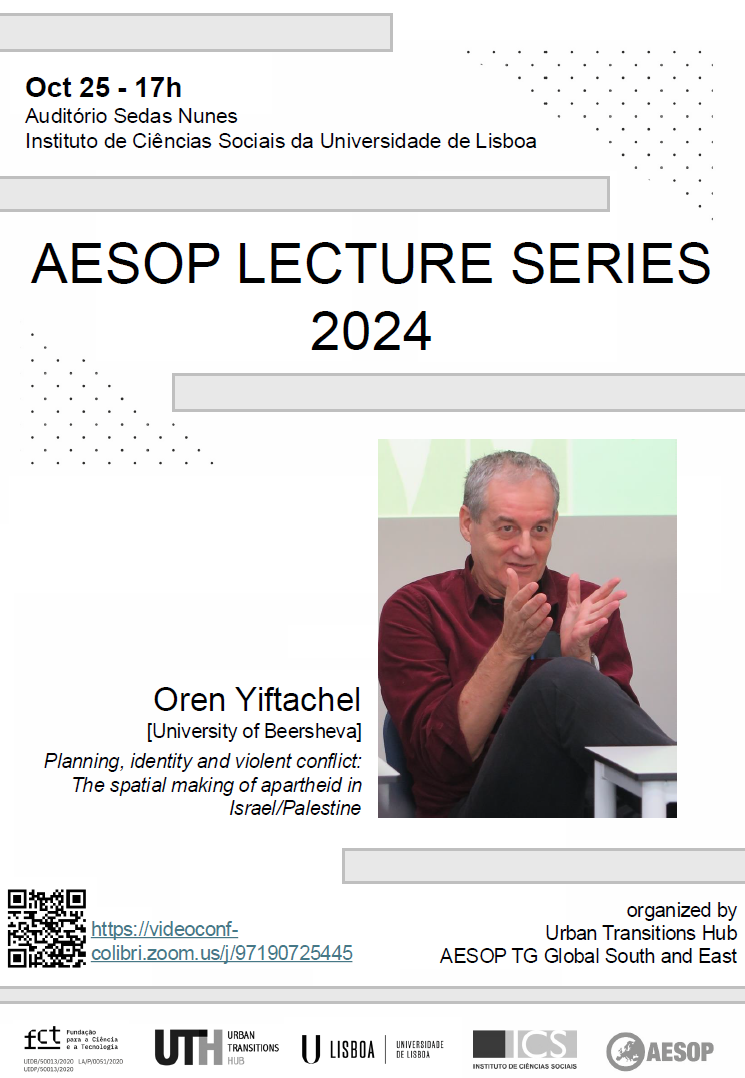The Urban Transitions Hub of ICS-ULisboa and the AESOP Thematic Group Global South & East will host AESOP Lecture with Oren Yiftachel (Lloyd Hurst Family Chair of Urban Studies at Ben-Gurion University of the Negev) in Lisbon (and online).
Oren will deliver a keynote titled Planning, identity and violent conflict: the spatial making of apartheid in Israel/Palestine.
The Lecture will take place at ICS-ULisboa on October 25th, 2024 (Auditório Sedas Nunes) at 17.00 (Lisbon time) and will be streamed on zoom via this link.
Below the flyer a short text of introduction for the Lecture.

Hamas’ attack of October 7th, 2023, and Israel’s ongoing military campaign in Gaza have provided the world with a stark reminder of the continued existence of a deep, entrenched conflict around issues of land, human rights, and collective identities in Israel/Palestine.
Geographical and territorial issues are at the centre of this conflict. The history of Israel/Palestine offers a particularly broad and varied catalogue of territorial arrangements and dynamics, spanning from the last decades of Ottoman Rule to the creation of the mandate of Palestine, to the present debate on Jewish colonization and Palestinian statehood. Starting with 1967, the progressive entrenchment of Israel’s occupation has brought on a de facto annexation of the West Bank and Gaza, creating a system of asymmetric citizenship in which the Arab population suffers from various degrees of disenfranchisement. Throughout this period, Israel’s policies have thoroughly reshaped the pre-existing spatial, economic, and human landscape, and resulted into a full-fledged system of control over the Arab population.
Spatial planning and governance have thus historically played a key role in shaping the relations between the two communities. And indeed, generations of planners and geographers, in Israel/Palestine and abroad, have offered some of the key scholarly contributions on the topic. Conversely, it would not be an exaggeration to say that the study of Israel/Palestine has produced influential contributions for planning theory and political geography as a whole (including in relation to the concept of “Global South” or, as Oren Yiftachel would have it, “South-East”), because of the visibility of problems, contradictions, and tensions inherent to the dynamics of uneven development and the colonial heritage. As the Israeli geographer David Newman noted, Israel/Palestine “constitutes a live laboratory for the study of the political geography, ranging from the national to both the local and global levels of geopolitical and spatial analysis”.
Building on this wealth of past contributions, and against the background of the current tragedy developing in Israel/Palestine, it is crucial, today, to continue this reflection and understand how the academic debate on spatial planning and territorial governance can contribute in the construction of an alternative future in Israel/Palestine – providing a forum for discussion, producing analyses on the reality on the ground, and fostering planning practices that are consciously and genuinely democratic.
The 2024 AESOP Lecture Series at ICS-ULisboa will address these issues, bringing into conversation planners, urban theorists, policymakers and activists.

